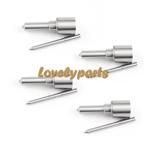Information injection-pump assembly
ZEXEL
101482-9111
1014829111
NISSAN-DIESEL
1679090312
1679090312
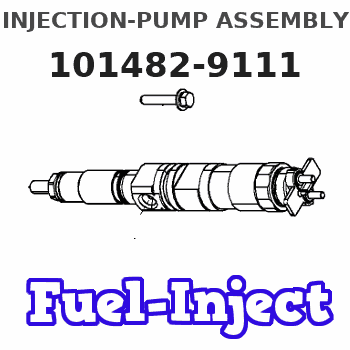
Rating:
Service parts 101482-9111 INJECTION-PUMP ASSEMBLY:
1.
_
5.
AUTOM. ADVANCE MECHANIS
6.
COUPLING PLATE
8.
_
9.
_
11.
Nozzle and Holder
16600-90104
12.
Open Pre:MPa(Kqf/cm2)
18.1{185}
15.
NOZZLE SET
Cross reference number
ZEXEL
101482-9111
1014829111
NISSAN-DIESEL
1679090312
1679090312
Zexel num
Bosch num
Firm num
Name
Calibration Data:
Adjustment conditions
Test oil
1404 Test oil ISO4113 or {SAEJ967d}
1404 Test oil ISO4113 or {SAEJ967d}
Test oil temperature
degC
40
40
45
Nozzle and nozzle holder
105780-8140
Bosch type code
EF8511/9A
Nozzle
105780-0000
Bosch type code
DN12SD12T
Nozzle holder
105780-2080
Bosch type code
EF8511/9
Opening pressure
MPa
17.2
Opening pressure
kgf/cm2
175
Injection pipe
Outer diameter - inner diameter - length (mm) mm 6-2-600
Outer diameter - inner diameter - length (mm) mm 6-2-600
Overflow valve
131424-1520
Overflow valve opening pressure
kPa
157
123
191
Overflow valve opening pressure
kgf/cm2
1.6
1.25
1.95
Tester oil delivery pressure
kPa
157
157
157
Tester oil delivery pressure
kgf/cm2
1.6
1.6
1.6
Direction of rotation (viewed from drive side)
Right R
Right R
Injection timing adjustment
Direction of rotation (viewed from drive side)
Right R
Right R
Injection order
1-3-4-2
Pre-stroke
mm
3.2
3.15
3.25
Beginning of injection position
Drive side NO.1
Drive side NO.1
Difference between angles 1
Cal 1-3 deg. 90 89.5 90.5
Cal 1-3 deg. 90 89.5 90.5
Difference between angles 2
Cal 1-4 deg. 180 179.5 180.5
Cal 1-4 deg. 180 179.5 180.5
Difference between angles 3
Cyl.1-2 deg. 270 269.5 270.5
Cyl.1-2 deg. 270 269.5 270.5
Injection quantity adjustment
Adjusting point
A
Rack position
10.7
Pump speed
r/min
1200
1200
1200
Average injection quantity
mm3/st.
59.9
58.9
60.9
Max. variation between cylinders
%
0
-3.5
3.5
Basic
*
Fixing the lever
*
Injection quantity adjustment_02
Adjusting point
-
Rack position
9.2+-0.5
Pump speed
r/min
450
450
450
Average injection quantity
mm3/st.
8
6
10
Max. variation between cylinders
%
0
-10
10
Fixing the rack
*
Remarks
Adjust only variation between cylinders; adjust governor according to governor specifications.
Adjust only variation between cylinders; adjust governor according to governor specifications.
Injection quantity adjustment_03
Adjusting point
D
Rack position
-
Pump speed
r/min
100
100
100
Average injection quantity
mm3/st.
62
62
72
Fixing the lever
*
Rack limit
*
Test data Ex:
Governor adjustment
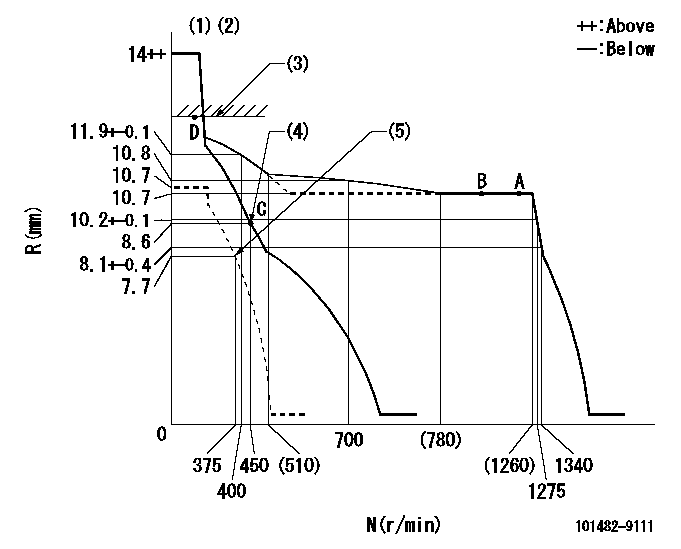
N:Pump speed
R:Rack position (mm)
(1)Target notch: K
(2)Tolerance for racks not indicated: +-0.05mm.
(3)RACK LIMIT
(4)Main spring setting
(5)Set idle sub-spring
----------
K=13
----------
----------
K=13
----------
Speed control lever angle
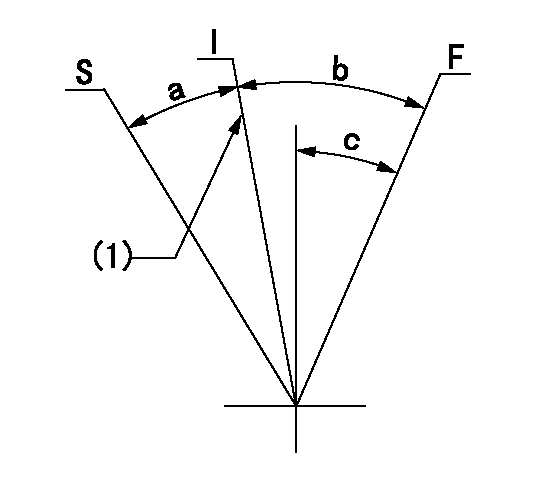
F:Full speed
I:Idle
S:Stop
(1)Set the stopper bolt at delivery
----------
----------
a=26deg+-5deg b=19deg+-5deg c=10deg+-5deg
----------
----------
a=26deg+-5deg b=19deg+-5deg c=10deg+-5deg
Stop lever angle
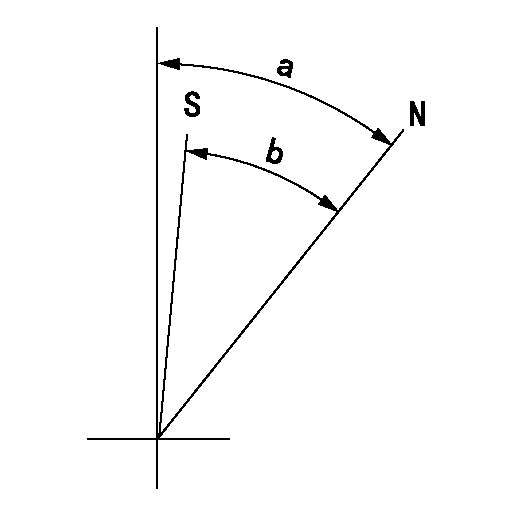
N:Pump normal
S:Stop the pump.
----------
----------
a=56.5deg+-5deg b=53deg+-5deg
----------
----------
a=56.5deg+-5deg b=53deg+-5deg
Timing setting

(1)Pump vertical direction
(2)Position of gear mark 'ZZ' at No 1 cylinder's beginning of injection
(3)-
(4)-
----------
----------
a=(100deg)
----------
----------
a=(100deg)
Information:
When fuel has stopped flowing out, turn the crankshaft slightly in the reverse direction such that fuel flows out. Then, slowly turn the crankshaft clockwise again to more accurately verify the point at which fuel stops flowing out.
End of fuel flow(c) If the IT mark on the crankshaft pulley and the mark on the gear case are aligned when fuel stops flowing out the injection timing is normal.
Timing marks(3) Adjustment
(a) If the injection timing is out of specification, make adjustments by increasing or decreasing the thickness of the injection pump's mounting shim. A change of 0.1 mm in the shim thickness yields a change of approximately 1° in the injection timing.
Injection timing adjusting shim(b) Increasing the shim thickness retards the injection timing, and decreasing the shim thickness advances it. Shims come in 9 different thicknesses from 0.2 mm (0.008 in.) to 1.0 mm (0.039 in.) at intervals of 0.1 mm (0.004 in.). The thickness is not indicated on the shim, so any shim should be measured with a vernier caliper before being used.
Before using any shim, apply sealant to both sides to prevent oil leakage.
(c) After making adjustments, check the injection timing is correct.(d) Close the cock on the fuel filter, then fit the delivery valve spring and injection pipe in their original positions.
Adjusting injection timingAdjusting Idle Speed
(1) Preparation for Adjustment
(a) Warm up the engine unit the coolant reaches a temperature of 60°C (140°F) or higher.(b) Make sure the valve clearances, injection timing, and injectors are normal.(2) Adjusting Low-Idle Speed
Loosen the locknut on the idling set bolt, turn the bolt to achieve the specified low-idle speed (1000 25min-1), then tighten the lock nut to hold the bolt in that position.(3) Adjusting No-Load Maximum Speed
Loosen the lock nut on the high-speed set bolt, turn the bolt to achieve the specified no-load maximum speed (2600 +30-10 min-1), then tighten the lock nut to hold the bolt in that position.
Adjusting idle speedAdjusting Fan Belt Tension
(1) Press the fan belt with the specified force mid-way between the alternator pulley and crankshaft pulley, and observe the extent of deflection.Unit: mm (in.) (2) If the extent of deflection is out of specification, loosen the adjusting bolt and adjust the fan belt tension by moving the alternator. Retighten the adjusting bolt securely.
Adjusting fan belt tensionRunning in the Engine
After an overhaul, the engine should be tested and inspected on a dynamometer. This operation serves to run in the engine's major moving parts.Starting the Engine
(1) Before starting the engine, check the coolant, engine oil and fuel levels and bleed all air out of the fuel and cooling systems.(2) Without supplying fuel to the engine, crank the engine for about 10 seconds to permit oil to circulate through it.(3) Move the speed control lever slightly in the fuel-increase direction. (Do not move the lever to the full-injection position.) Then, turn the starter switch to the START position to start the engine.(4) Once the engine has started, set it to the low-idle speed using the speed control lever.Inspection after
End of fuel flow(c) If the IT mark on the crankshaft pulley and the mark on the gear case are aligned when fuel stops flowing out the injection timing is normal.
Timing marks(3) Adjustment
(a) If the injection timing is out of specification, make adjustments by increasing or decreasing the thickness of the injection pump's mounting shim. A change of 0.1 mm in the shim thickness yields a change of approximately 1° in the injection timing.
Injection timing adjusting shim(b) Increasing the shim thickness retards the injection timing, and decreasing the shim thickness advances it. Shims come in 9 different thicknesses from 0.2 mm (0.008 in.) to 1.0 mm (0.039 in.) at intervals of 0.1 mm (0.004 in.). The thickness is not indicated on the shim, so any shim should be measured with a vernier caliper before being used.
Before using any shim, apply sealant to both sides to prevent oil leakage.
(c) After making adjustments, check the injection timing is correct.(d) Close the cock on the fuel filter, then fit the delivery valve spring and injection pipe in their original positions.
Adjusting injection timingAdjusting Idle Speed
(1) Preparation for Adjustment
(a) Warm up the engine unit the coolant reaches a temperature of 60°C (140°F) or higher.(b) Make sure the valve clearances, injection timing, and injectors are normal.(2) Adjusting Low-Idle Speed
Loosen the locknut on the idling set bolt, turn the bolt to achieve the specified low-idle speed (1000 25min-1), then tighten the lock nut to hold the bolt in that position.(3) Adjusting No-Load Maximum Speed
Loosen the lock nut on the high-speed set bolt, turn the bolt to achieve the specified no-load maximum speed (2600 +30-10 min-1), then tighten the lock nut to hold the bolt in that position.
Adjusting idle speedAdjusting Fan Belt Tension
(1) Press the fan belt with the specified force mid-way between the alternator pulley and crankshaft pulley, and observe the extent of deflection.Unit: mm (in.) (2) If the extent of deflection is out of specification, loosen the adjusting bolt and adjust the fan belt tension by moving the alternator. Retighten the adjusting bolt securely.
Adjusting fan belt tensionRunning in the Engine
After an overhaul, the engine should be tested and inspected on a dynamometer. This operation serves to run in the engine's major moving parts.Starting the Engine
(1) Before starting the engine, check the coolant, engine oil and fuel levels and bleed all air out of the fuel and cooling systems.(2) Without supplying fuel to the engine, crank the engine for about 10 seconds to permit oil to circulate through it.(3) Move the speed control lever slightly in the fuel-increase direction. (Do not move the lever to the full-injection position.) Then, turn the starter switch to the START position to start the engine.(4) Once the engine has started, set it to the low-idle speed using the speed control lever.Inspection after
